Canada wildfire: Alberta blaze threatens neighbouring province
- Published
One evacuee described the fire as majestic and menacing
A huge wildfire raging in the Canadian province of Alberta is growing further and could spill into neighbouring Saskatchewan, officials say.
Hot, dry and windy conditions are hampering efforts by hundreds of firefighters to tackle the blaze.
Officials say it is not uncommon for such fires to go on for months.
The flames have already caused the evacuation of 80,000 people from the oil city of Fort McMurray, and thousands are still stuck to the north.
Their evacuation, originally planned for Saturday, will now take place on Sunday.
"In no way is this fire under control,'' said Alberta Premier Rachel Notley.
The wildfire now covers an area of more than 700 sq miles (2,000 sq km), which includes areas still ablaze and areas already burnt.
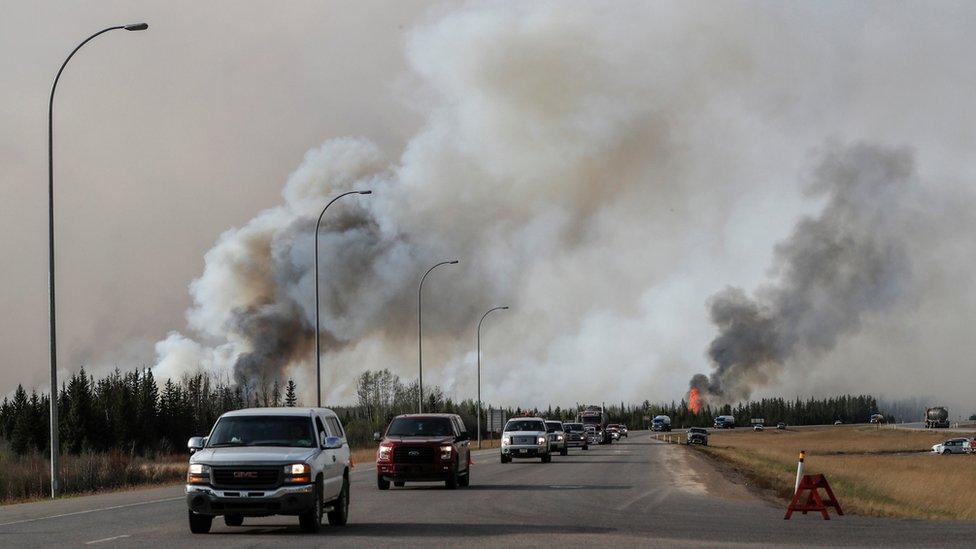
Convoys continued on Saturday, with all those stuck north of Fort McMurray due to be evacuated by the end of the day
It was being propelled by high winds to the north-east towards Saskatchewan and was expected to reach the province by the end of Saturday.
Smoke from the fire has already spread there, and air quality statements have been issued for both Saskatchewan, external and Northwest Territory.
"Fire conditions remain extreme," said the Alberta Emergency Management Agency late on Saturday.
There is the possibility of rain on Sunday and Monday, but officials say the fire can only be put out by sustained heavy rains.
Nick Waddington from the Fort McMurray Fire Department paid tribute to the efforts of firefighters on BBC Radio 4's Broadcasting House.
"We had one member stand at the end of his driveway, watch his house burn to the ground and put in an 18-hour shift," he told Paddy O'Connell.
Earlier this week, most evacuees headed south but some fled north, sheltering in work camps beyond Fort McMurray.
Thousands have since been shuttled out by road and air, with small convoys passing through the fire-ravaged city on Saturday.
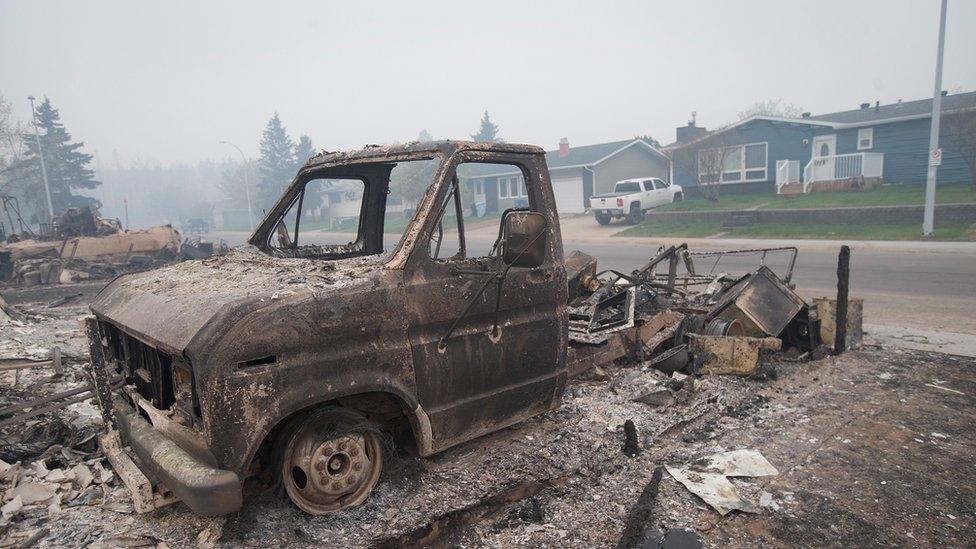
The huge blaze left scenes like this in Fort McMurray
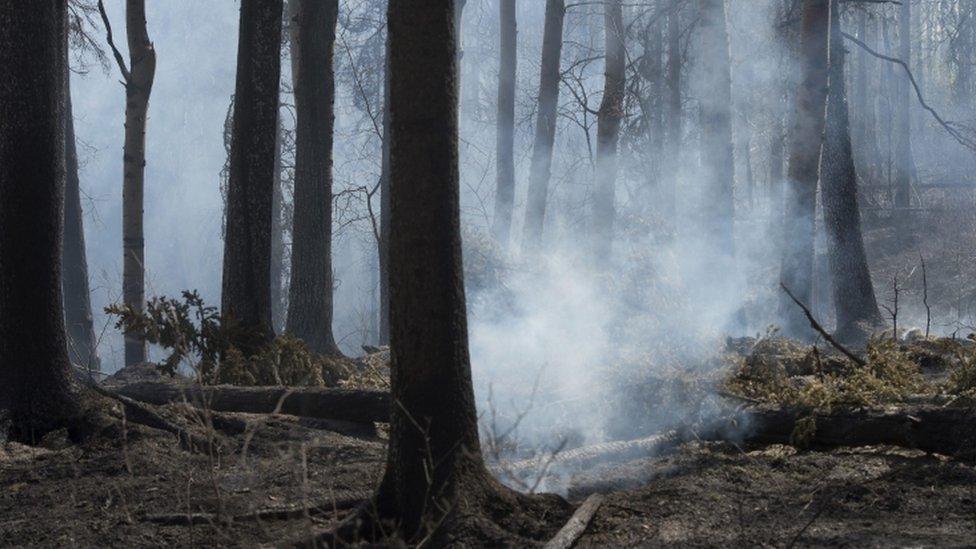
Hot, dry weather is helping the fire spread
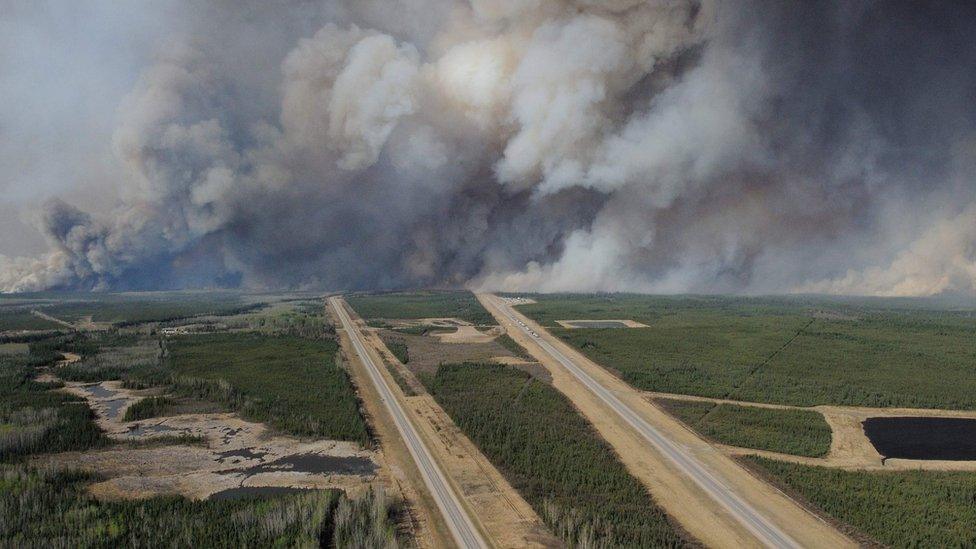
The fire is now bearing down on the neighbouring province of Saskatchewan
The blaze has ruined entire neighbourhoods, with residents warned it could be some time before they can return. Officials say the power grid is damaged and the water not drinkable.
Despite the mandatory order to leave, the Royal Canadian Mounted Police (RCMP) have said they found an elderly man and a family of five in Fort McMurray. They were led to safety.
Some 1,600 homes and other buildings have been lost but no deaths or injuries have been reported.
Fort McMurray is in the heart of Canada's oil sands country, and the region has the world's third-largest reserves of oil.
As much as a quarter of the country's oil production has been halted by the fire, raising concerns about the effect on the Canadian economy.
There are warnings the blaze could burn to the edge of a facility run by Suncor Energy but officials said the risk of damage was low.
"These sites are very resilient to wildfire, largely because they're free and clear of vegetation and trees," said Chad Morrison, Alberta's head of wildfire prevention.
"...They also have highly trained industrial fire departments that know how to respond to these incidents."

'Complete blocks levelled'
Local DJ Chris Byrne was allowed back into Fort McMurray to check on the damage. He told BBC Newshour what he found.
"Downtown for the most part is still for the most part intact, I think only one building was affected.
"Where I live, in the north end of town, there really wasn't much damage. There are still people living there that just refused to evacuate.
"The worst parts of the city are exactly how people imagined a wildfire going through a town would look like.
"Complete blocks [are] levelled and charred and it looks like a horrific scene."

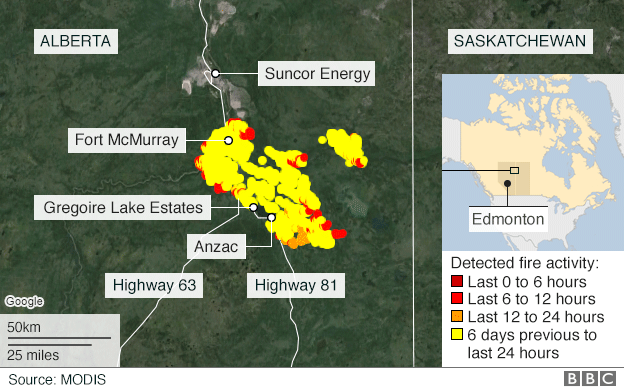

Are you in the area? Have you been affected? You can share your experience by emailing haveyoursay@bbc.co.uk, external.
Please include a contact number if you are willing to speak to a BBC journalist. You can also contact us in the following ways:
Whatsapp: +44 7525 900971
Send pictures/video to yourpics@bbc.co.uk, external
Tweet: @BBC_HaveYourSay, external
Send an SMS or MMS to +44 7624 800 100

